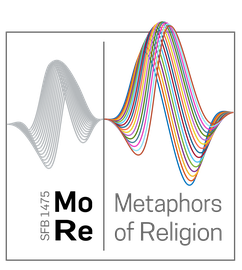
The Lord is My Goalkeeper – Football and Religion in Light of their Metaphors
A Collaborative Research Centre on Religion and Metaphor is holding an event at the Football Museum – as happened last Wednesday evening at the German Football Museum in Dortmund. "With our public relations work, we don't just want to reach those who usually attend lectures in the humanities," says Dr. Tim Karis, head of the PR project at the CRC. "To do this, we need thematic openness and a willingness to hold events in places that might not be the first thing that comes to mind when thinking about religion and metaphor."
The Football Museum is a place that impressively documents the history of the Federal Republic of Germany, including its religious history. As Dr. Henry Wahlig, responsible for the cultural and events program, points out in a special tour for CERES students, the museum is dedicated to Jewish soccer history, among other things. Particularly impressive is the prominently displayed jersey of the Jewish soccer champion of 1938, Schild Bochum, worn shortly before fleeing Nazi Germany.
The event room above the rooftops of Dortmund is very well filled for the panel discussion in the evening. Moderator Matthias Friebe from Deutschlandfunk repeatedly asks about the power of metaphors. Can there be a soccer god for a devout Christian or Jew? Not for Leonid Chraga, managing director of the Jewish community in Dortmund and chairman of Maccabi Bochum. He points out that the name of God must not be misused: "The second commandment is not easy-peasy!" The Christian representatives take a similar view: Klaus Pfeffer, Episcopal Vicar General in the diocese of Essen and fan of FC Schalke, does not believe in the soccer god, but is attentive to the integrative power of soccer, which is all too often lacking in churches today. Karsten Haug is a pastoral worker at the Dreifaltigkeitskirche on Borsigplatz – better known as BVB's founding church. Where Borussia once saw the light of day, there is actually no longer a need for a church today - there are too few churchgoers in Dortmund's Nordstadt district. But the church is still there – with the support of BVB.
Sarah Rautert, religious studies scholar at CERES, explains: Depending on how you define religion, you can speak of soccer as a kind of substitute religion. The integrative power, the rituals, the myths. "What tends to be missing is the reference to transcendence," says Rautert, but Haug disagrees: "When the crowd in the Westfalenstadion spontaneously sang You'll Never Walk Alone after losing the season finale - that was quite uplifting."
The panel discusses, fittingly, for around 90 minutes about pilgrimaging soccer fans, Germany's chances at the European Championship, soccer god Jürgen Kohler, FC Schalke's relegation worries, the reconciling power of sport and the impossibility for pious Jews to play soccer on Saturday at 3:30 pm. Is it OK, asks presenter Friebe, to light three candles in church for three points? "Why not," says Vicar General Pfeffer, "but will it help?"

